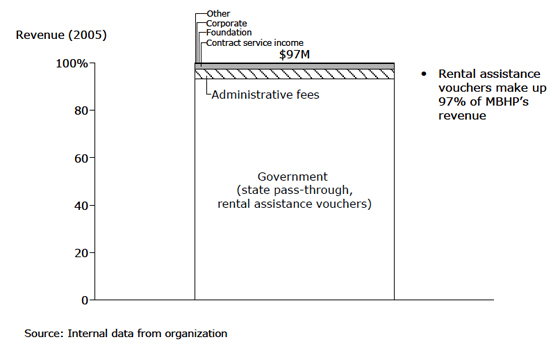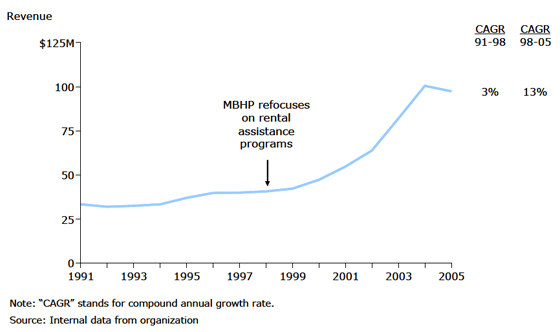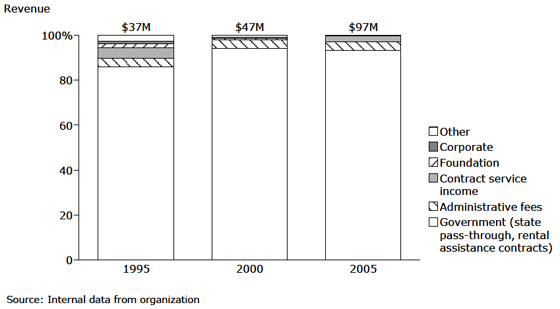We don't want money for money's sake. We raise funds based on the real gaps in the community and our strengths.
– Julia Kehoe, Executive Director
Overview
Related Content
How Nonprofits Get Really BigOrganization Profiles from How Nonprofits Get Really Big
Metropolitan Boston Housing Partnership (MBHP) is a regional nonprofit administering state and federal rental assistance voucher programs in the greater Boston area. Born from the merger in 1991 of the Boston Housing Partnership and Metropolitan Housing, Inc., MBHP now administers housing vouchers for 7,500 families in 30 communities around Boston.
Voucher programs pay a portion of the rent for open market units above 30% of the residents’ income and below a specific limit. As a nonprofit, MBHP can provide the value-added services that government alone cannot. For example, it offers consumer housing education programs and self-sufficiency programs. MBHP also runs scattered site emergency shelters and provides equity services and asset management for over 900 affordable units.
HUD’s Housing Choice Voucher program (also called Section 8) makes up the bulk of MBHP's funding. The vouchers flow through the Massachusetts Department of Housing and Community Development (DHCD). MBHP passes the majority of these funds through to landlords, taking an administrative fee of approximately 4%. Corporate and foundation sources provided a small amount of unrestricted funding that allows MBHP to serve individuals that do not meet government eligibility requirements.
Founding date: 1983 (Boston Housing Partnership), 1989 (Metropolitan Housing, Inc.)
Revenue (2005): $97 million
Structure: Single organization
NCCS classification: Housing & shelter
Services: Provides rental assistance vouchers; supported housing; consumer housing education; scattered site emergency shelters; homelessness prevention and housing stabilization services; and real estate asset management services for affordable units
Beneficiaries: Homeless families, low-income families, people with disabilities, and the elderly
Leadership (selected): Julia Kehoe, Executive Director
Address: 125 Lincoln Street, Boston, MA 02111
Website: www.mbhp.org

Growth Story
- 1983 – Boston Housing Partnership (BHP) is founded to rehabilitate and manage scattered site housing units in partnership with government, local banks, and community development corporations (CDCs).
- 1987 – BHP expands into community organizing to help residents address building management, security, and community development issues with property owners and social service agencies.
- 1989 – The state community development agency contracts with newly-formed Metropolitan Housing, Inc. (MHI) for the administration of 4,500 rental assistance vouchers.
- 1991 – BHP and MHI merge, becoming MBHP.
- Early 1990s – Rental assistance programs grow rapidly, but development opportunities dwindle as CDCs grow in number and capacity.
- 1998 – MBHP commits to rental assistance as its core program.
- 2000 – MBHP’s leadership transitions. The agency restructures from small departments organized around government funding sources to two large divisions based on function.
- 2002 – Julia Kehoe becomes MBHP’s executive director. The organization moves into prevention assistance, attracting new funds.
Revenue Trends
Revenue growth: MBHP’s revenue has closely followed the growth in federal funding for rental assistance housing voucher programs.

Funding mix: The overwhelming majority of MBHP’s revenue comes from the voucher revenue pass-through of state or federal funds to landlords.

Actions That Helped Propel Growth in Funding
- Focused its efforts on an unmet need. After growing to be a full spectrum developer and housing services provider, MBHP surveyed Boston’s housing needs. It found many community development corporations (CDCs) that had the capacity for real estate development, but fewer that were administering rental assistance. Mapping its strengths to community needs, MBHP refocused on rental assistance.
- Got the operational aspects right. The government allocates rental assistance vouchers in fits and starts, and reallocates vouchers that are not used in a timely fashion. MBHP’s ability to take a large influx of vouchers (up to 2,000), convene tenants in its large facility, and house families quickly makes them an asset to government agencies.
- Worked collaboratively. MBHP’s origins lie in a collaboration between local banks, CDCs, government agencies, and concerned individuals. That legacy has helped MBHP create and maintain strong relationships—not only with government funders, but also with other nonprofits and property owners who rent to families with vouchers. As a consequence, MBHP is well positioned to fulfill its mission of helping families find and retain housing.
- Managed its costs. Coming out of a strategic planning process in 1998, MBHP suspended community organizing and homeownership programs for financial reasons. Its board directed MBHP not to take on future contracts that would not cover costs unless absolutely critical to the mission.
Funding Challenges
- Facing steep competition. Extensive competition in the real estate development field prompted MBHP to exit this arena.
- Supporting work not eligible for government funding. MBHP can apply its government funding only to serving individuals who meet specific eligibility requirements. MBHP uses its unrestricted funding (mainly from foundation and corporate sources) to support its work where need and eligibility are not aligned.

